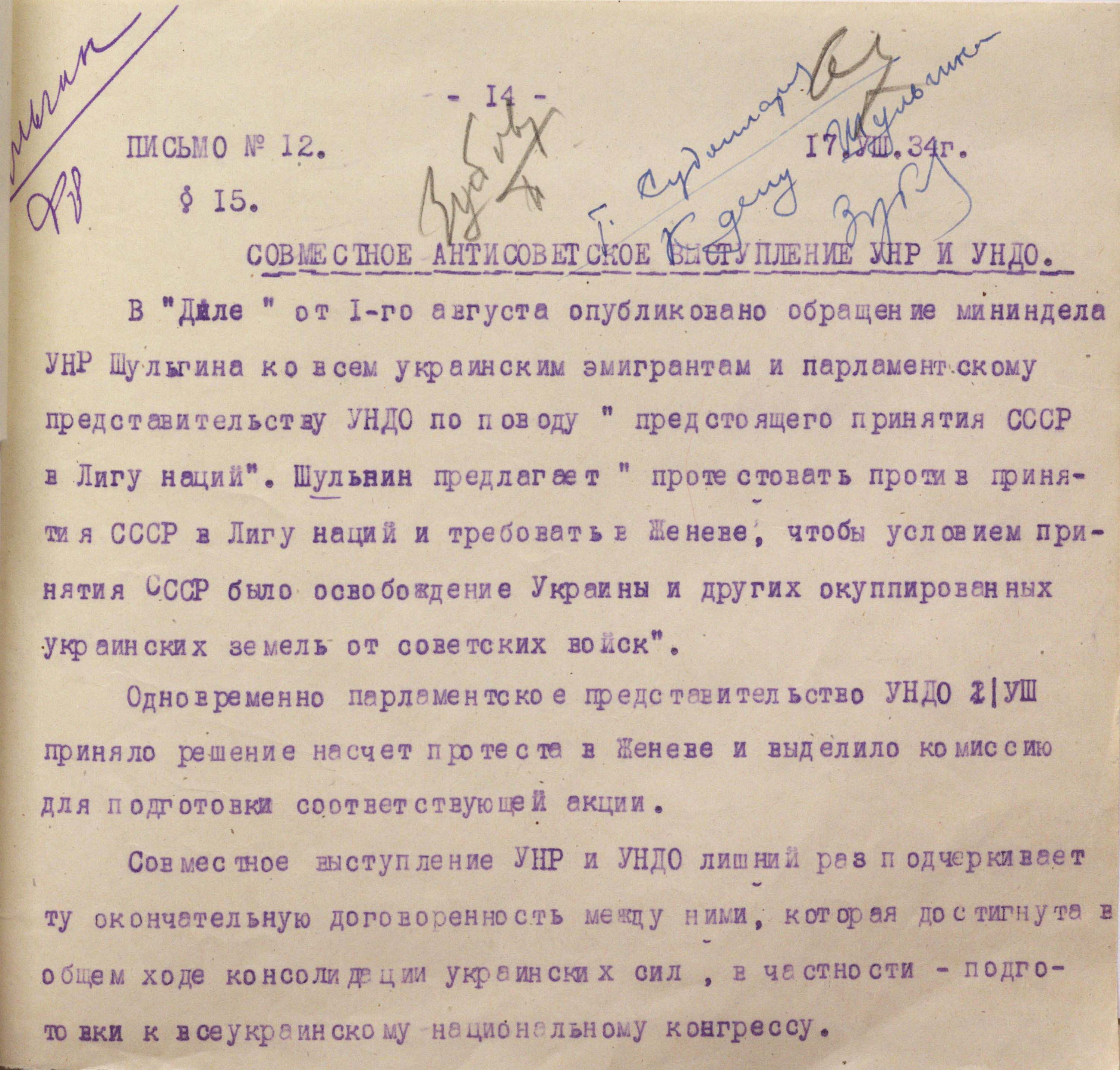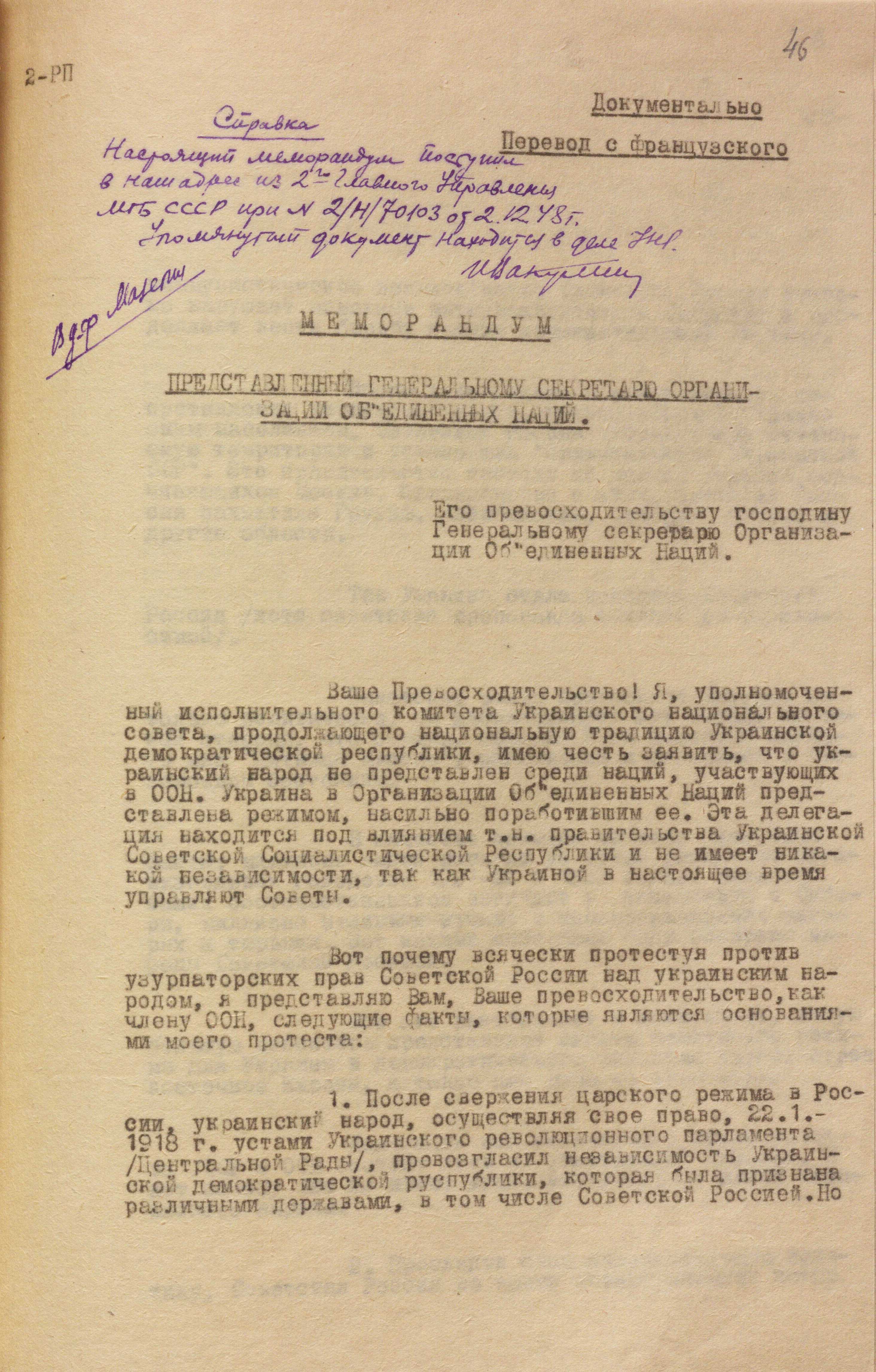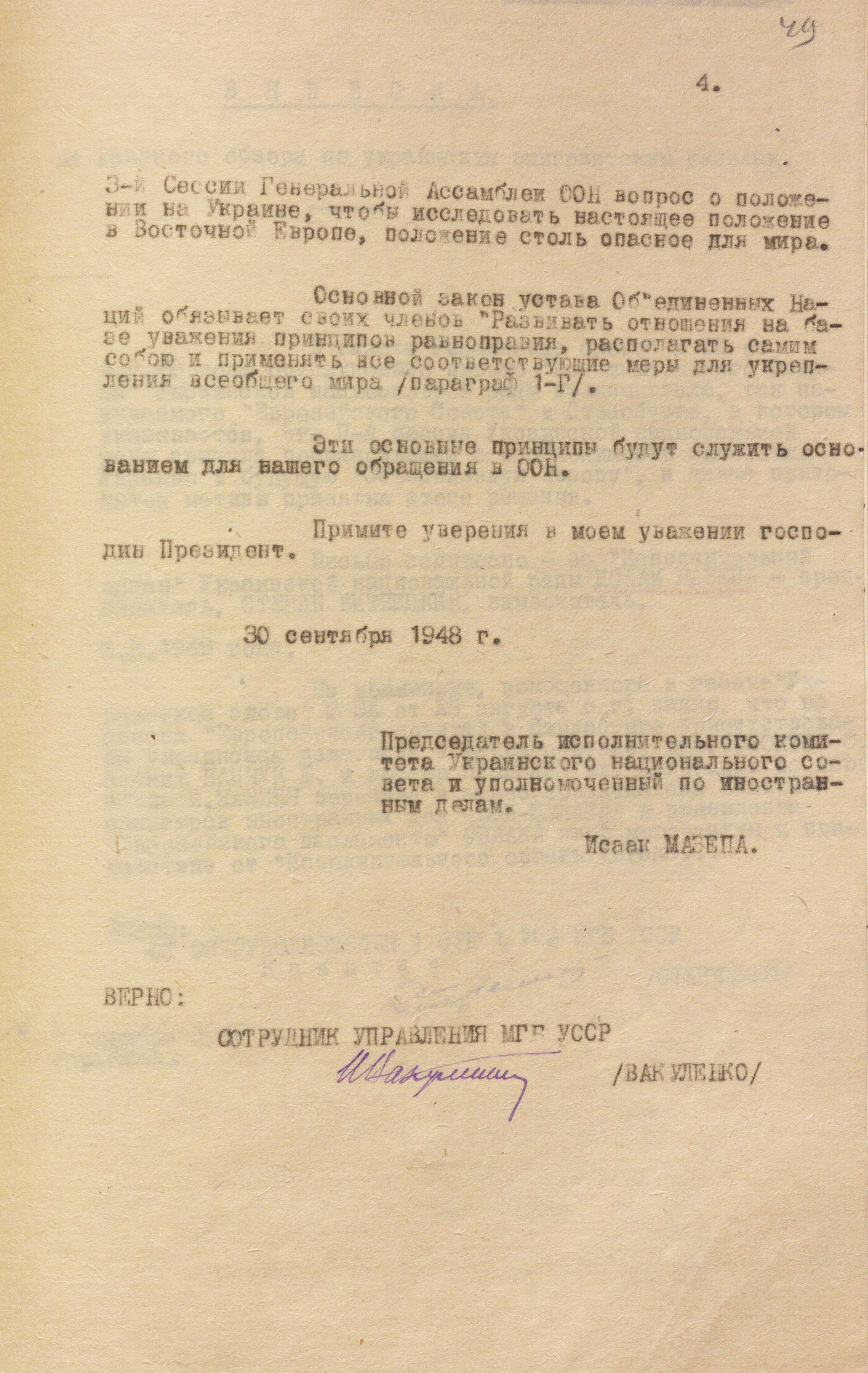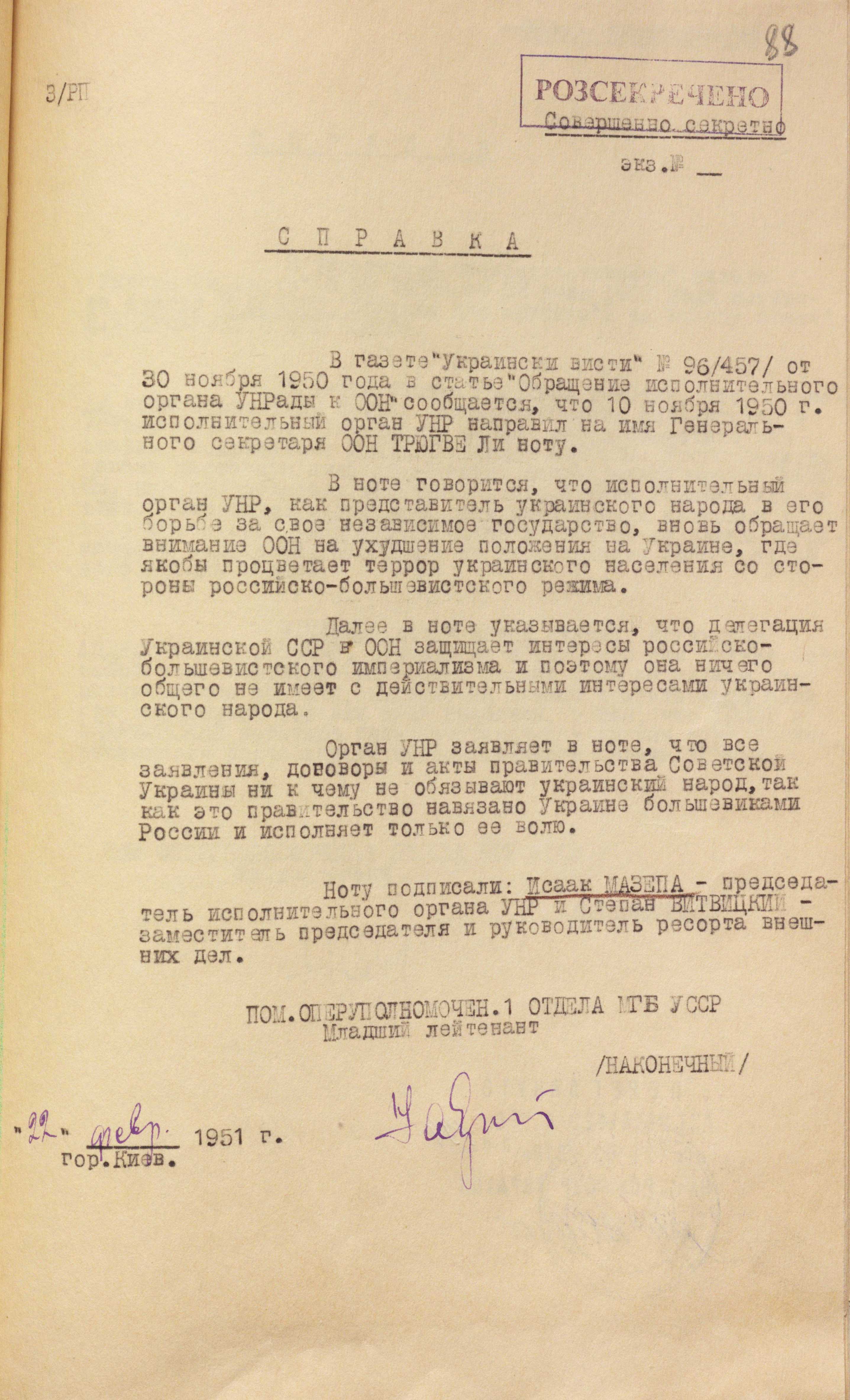Ukrainian Emigration – Against the USSR’s Presence in the League of Nations
4/6/2023
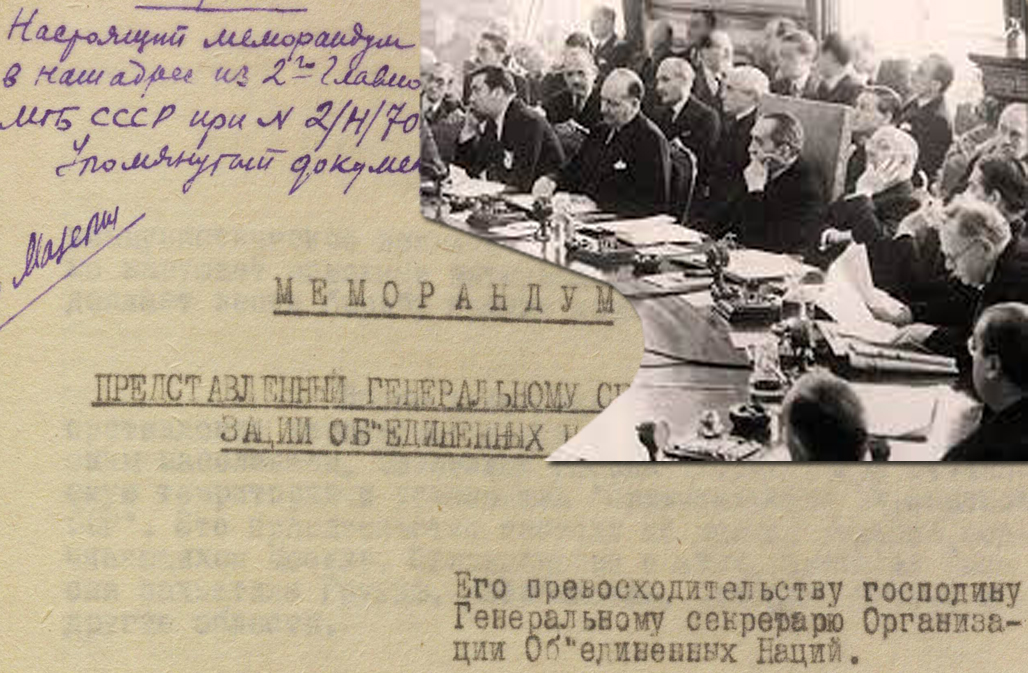
Among the archival documents of the Intelligence there are materials about how representatives of Ukrainian emigration tried to defend the rights of Ukrainians in the League of Nations, protested against their violation by the Soviet communist regime and even strongly opposed the presence of the USSR both in this international organization and in the United Nations, which later emerged in its place.
One of those who most actively used this rostrum in the national interest was the prominent Ukrainian diplomat Oleksandr Shulhyn. As long-term Minister of Foreign Affairs of the UPR Government in exile, for almost twenty years he represented its interests in various organizations of the League of Nations. In particular, he was the head of the Ukrainian delegation at the first assembly of the organization, as well as a regular participant in the forums of the International Union of Supporters of the League of Nations, which brought together representatives of more than fifty countries.
Ukrainian Society was one of them. At the same time, O. Shulhyn and other representatives of the UPR Government in exile constantly criticized the Bolshevik policy in the Ukrainian SSR, defended Ukrainians who were subjected to infringement of their rights. At a meeting of one of the subcommittees of the League of Nations, A. Shulhyn stated that he and the Ukrainian Society had a very responsible duty and great responsibility to represent the Great Ukraine. “But we take on our shoulders this heavy responsibility”, he said, “mainly because today in the so-called secular Ukraine there is not a single person freely elected by the people, everything is politically strangled there. Someone must speak, defend a great Ukrainian people. We fulfill this duty, we are obliged to do everything for our people”, (BSA of the SZR of Ukraine. – F.1. – Case 6687. – V.1. –P. 51).
O. Shulhyn repeatedly opposed the Bolshevik terror in the Ukrainian SSR, forced labor, famine, artificially created by the Soviet authorities. In September 1933, he personally addressed in a letter the Head of the Council and Chairman of the 14th Assembly of the League of Nations calling for international assistance to the starving. And during the discussion of this issue at the commissions of the League of Nations, the diplomat and his colleagues demanded to condemn the famine in Ukraine as an act of genocide. In the views of the members of the League, often due to poor knowledge of the situation, there was no unanimity in supporting the Ukrainian position. Despite this, representatives of the UPR achieved recognition of the problem of the famine and provision of humanitarian aid to Ukrainians. It was a great victory, although the USSR continued to deny the extermination of the Ukrainian people.
On the eve and immediately after the USSR’s joining the League of Nations in 1934, O. Shulhyn's appeals regarding the situation of Ukrainians became much sharper and more uncompromising. One of the documents cites his open letter, published in the press, entitled “The USSR Should Not Dare to Sit in the League of Nations”. It points out:
«We, Ukrainians, cannot be indifferent to the USSR’s joining the League of Nations. Our State Center instructed me to submit a corresponding protest on its behalf. But our whole society, not only emigrants, but also representatives of Galicia and Volhynia, Bukovyna and Subcarpathia, as well as citizens of Canada or the United States of America, should send appropriate protests over this to the Secretary General of the League of Nations.
We do not want to silently pass by the fact that Moscow, which keeps Ukraine under heavy occupation, is admitted to the League of Nations and thereby the crime committed against us is sanctioned” (BSA of the SZR of Ukraine. – F.1. – Case 6687. – V.1. –P. 52).
Another archival document entitled “Joint Anti-Soviet Speech of the UPR and UNDO”, dated August 17, 1934, refers to O. Shulhyn's appeal to all Ukrainian emigrants and the parliamentary representation of the UNDO (Ukrainian National Democratic Association) regarding the admission of the USSR to the League of Nations. “Shulhyn proposes”, the document states, “to protest against the admission of the USSR to the League of Nations and demand in Geneva that the condition for the adoption of the USSR be the liberation of Ukraine and other occupied Ukrainian lands from Soviet troops” (BSA of the SZR of Ukraine. – F.1. – Case 6687. – V.1. – P. 67).
And such public protests were not uncommon. This is how this active political and social activity is reflected in a summary of the case file, dated September 1948. It states: “... As the official representative of the UPR at the Secretariat of the League of Nations, Shulhyn in 1933–1934 made memoranda and appeals against the USSR’s admission to the League of Nations…” (BSA of the SZR of Ukraine. – F.1. – Case 6687. – V.1. – P. 255).
Besides, O. Shulhyn used other international platforms to criticize the USSR and deprive it of its voice and influence on international politics. For example, in the archival funds of the Iintelligence there is a document dated January 8, 1947 entitled “On the Delivery of the Memorandum of the ABN (Anti-Bolshevik Bloc of Nations) to the Foreign Ministers of the United States, England and France”. It says that before the convening of the Paris Peace Conference, O. Shulhyn organized an action “to hand over a Memorandum of sharp anti-Soviet content”. “Speaking about the impression made on these Ministers by the ABN Memorandum”, reads the document, “President of the ABN Stetsko said: “Three Ministers especially liked the points where the issue of the USSR is acutely raised (expulsion of the Soviet delegation, putting the Soviet delegation on trial, etc.)” (BSA of the SZR of Ukraine. – F.1. – Case 6687. – V.1. –P. 225).
Soon Ukrainian leaders strongly protested against the USSR's membership in the UN. In particular, in July 1948, the Ukrainian National Council prepared and distributed a declaration in which it protested against the communist regime in Ukraine, stating that representatives of such a regime had no right to speak on behalf of the people: “The Ukrainian National Committee declares in this declaration that the so-called government of the Ukrainian SSR, which controls the Ukrainian people by armed force and terror, is just a puppet of the government of the Russian communists. Therefore, Ukrainian people will not be able to express their will on their own land unless their interests are represented before the world by the national center of the Ukrainian Democratic Republic” (BSA of the SZR of Ukraine. – F. 1. – Case 9780. – P. 48).
A few months later, the head of the Ukrainian emigration government, called the Executive Committee of the UPRada, Isaak Mazepa, initiated and signed a memorandum addressed to the Secretary-General of the United Nations. This document, which is stored in the archival funds of the Intelligence, is a kind of appeal to the world democratic community to pay attention to the real state of affairs in Ukraine, where Ukrainians are oppressed by the Soviet regime and forced to fight for their independence, and is also a kind of protest against the delegation of the Ukrainian SSR to the UN speaking on behalf of the Ukrainian people.
The Memorandum begins with the following words:
“To His Excellency Mr. Secretary-General of the United Nations.
Your Excellency! I, being authorized by the Executive Committee of the Ukrainian National Council, which continues the traditions of the Ukrainian Democratic Republic, have the honor to declare that Ukrainian people are not represented among the nations participating in the UN. Ukraine is represented at the United Nations by a regime that has forcibly enslaved it. This delegation is influenced by the so-called government of the Ukrainian Soviet Socialist Republic and has no independence, since Ukraine is currently governed by Soviets” (BSA of the SZR of Ukraine. – F. 1. – Case 9780. – P. 46).
To reinforce the protest, I. Mazepa outlined a number of facts that would have to prove to UN members the great danger posed by the power of the Soviet regime to Ukraine and the democratic development of other countries of Eastern Europe. In particular, he mentioned the millions of Ukrainians who died as a result of an artificial famine organized by the authorities, hundreds of thousands of repressed, accused of anti-Soviet activities and imprisoned in prisons and camps, deported to Siberia. “Thus, the communist regime of Soviet Russia”, the Memorandum says, “is dangerous for the democratic system and for world peace”.
In the final part of the Memorandum, I. Mazepa asked the UN Secretary-General to include the issue of the state of affairs in Ukraine and Eastern Europe into the agenda of the 3rd Session of the UN General Assembly.
Another note from the UNRada Executive Committee addressed to the UN Secretary-General is dated November 10, 1950. It draws attention to the deteriorating situation in the Ukrainian SSR, where “the terror of the Ukrainian population by the Russian-Bolshevik regime reigns”. The executive body of the UNRada pointed out in the note that “no statements, agreements and acts of the government of Soviet Ukraine oblige Ukrainian people to anything, since this government is imposed on Ukraine by the Bolsheviks of Russia and fulfills only Russia’s will” (BSA of the SZR of Ukraine. – F. 1. – Case 9780. – P. 88).
Therefore, the Ukrainian issue, as well as the question of the threat to the democratic world from Moscow, were put on the agenda at all times of the existence of such organizations as the League of Nations and the UN, and were discussed, some aggressive manifestations of the Kremlin were condemned, others did not get enough votes. But in general, the international community has not yet managed to overcome this threat.
